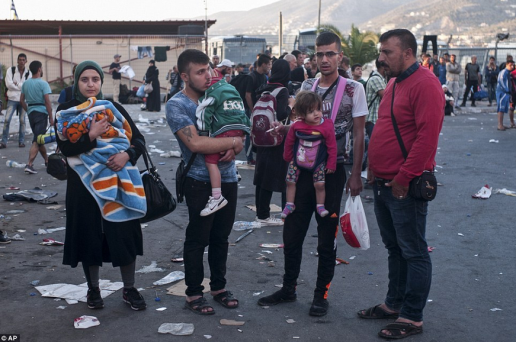The images of the Syrian refugees fleeing their homeland to make a perilous crossing over the sea to Greece have provoked an outpouring of compassion from ordinary people around the world. When little Aylan Kurdi’s lifeless body was washed up on the shores of a beach, the crisis seemed to strike home and people were shocked into action; this little boy who was playing in his home only a few months ago had drowned as his family sought safety; he could have so easily been our child.
Europe is in crisis, millions of displaced and dispossessed people are seeking safety from the horrors they have left behind; drought and war in Syria, lack of food and resources in the neighbouring countries (the UN humanitarian aid is failing in Lebanon and Jordan) and the inhospitable circumstances in Turkey where they cannot stay. They risk their lives to cross the Mediterranean to find safety, and many drown on the way.
The refugees who make it to the other side of the Mediterranean still have a long way to go; it is only the start point of a land route to Germany through Macedonia, Serbia and Hungary; refugees crowd onto the ferries to take them to the mainland. Once they are there, many will have to walk the rest of the way, and winter is coming. Greece is in economic crisis and the islands are tiny with no places for hundreds of thousands of refugees overwhelming them, there have been riots in some places. There is no infrastructure for managing these increasingly desperate needs; small charities on the Greek islands (such as Kos and Lesvos) are crying out for aid to supply to these refugees; vital things like nappies, wipes, toiletries, warm clothing, sturdy shoes, sanitary items, soap, etc. A contact I have on Kos (Kerry Horafiou, Kos Kindness) told me that many of the children have arrived only in their summer clothes and flimsy shoes. These people are ordinary members of the public, giving up their time, money and effort to show compassion to the needy.
Aylan Kurdi in life. His family have asked this photo of his life to be shared instead of his death.
How can you not want to help, to do something, to make a difference? Here in the UK, and around the rest of world, people are indeed trying to do something; donating to the major charities, lobbying the government and so on. For many of us, in addition to donations and lobbying, we want to do something tangible.
On Sept 1st I posted on my facebook page that I would be sending slings and aid to Kerry at Kos Kindness, She grew up in Rotherham; her husband is a carpenter on Kos. Their charity was set up in 2011 to reach out to people less fortunate in Greece around Christmas time to give them food supplies and little gifts. Now they are working full time to bring aid to the refugees, renting space in the many empty shops (due to the economic crisis) to store aid for distribution.
People asked me why I was sending slings, rather than just things like nappies, wipes, warm clothes and shoes. I am (and have) sent baby carriers to Kos for one reason; because Kerry, and many other workers on the ground, have said they are needed. Small children get lost in crowds of massed desperation. Small children are scared of all the chaos around them. Small children need to nurse (breast milk is safer for babies than formula made with dirty water that can make them very ill). Small children need to be carried somehow, especially on long and arduous journeys across a continent where snow is on the way. The arms of their parents provide safety, reassurance, familiarity, comfort, nutrition. But these same arms grow weary as the miles pass by. These same arms need to carry supplies. These same arms need to hold the hands of toddlers who can’t walk far…. A sling will make a real difference where arms are all that is available; car seats are heavy, pushchairs may struggle on rough terrain.
Let me add, sending slings is in addition to general aid.
Refugees in Greece – these children will need to be carried across the continent somehow; a sling will help ease the burden and keep a frightened child close. (Daily Mail image)
I expected maybe ten to 15 boxes of aid to be brought to my house for shipping. Over the weekend, the people of Sheffield came and they came and they came. They wept in my living room about how helpless they felt, how shocked they were. They brought bags and bags and bags. My friends came to help with the sorting and packing… we worked and worked and worked, aware that we were really hardly doing anything at all. On Sunday we had 140 boxes and 1.3 tonnes of aid. Yes, 1,300 kg of things that people had brought for the refugees. Six of those boxes are carriers. Today we shipped out about 50 carriers that will make their way to Kos and over the next few days we will ship out about 50 more, all labelled with pictorial instructions for use and pictorial safety guidance. Many people around the world are working on translating instructions into Arabic, Greek, Hungarian (another place in desperate need).
A few professionals are making their way to the places where the refugees are concentrating over the next few weeks to help families use these carriers, and are taking as much luggage of aid as they can. Families all around the world are sending aid and carriers as well as money, because they want to be involved in a tangible way, to feel connected somehow, with the refugees, who are, like us, people who want to live in safety.
1.3 tonnes of aid in 140 boxes….
1.3 tonnes of aid is not easy to ship; the big corporations and companies haven’t been interested; initial suggestions of support have withered away. Once again, it is the individuals who make a difference, who make things happen. My husband has hired a van to take the bulk of our donations to join the efforts of a good man (one among many) named Gary, of Care Without Borders, he is taking the love and solidarity of the people of Sheffield with him, and soon they will be in the air and on the way.
This map shows all the collection points we know of worldwide; get in touch with them to find out how you can help.

